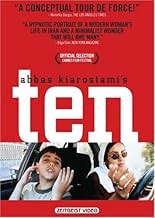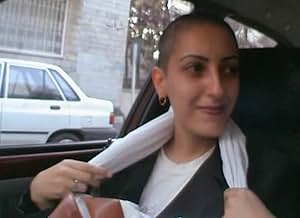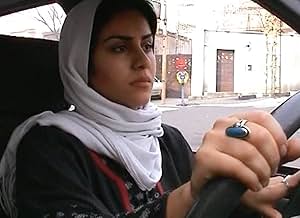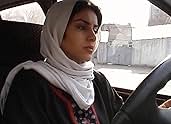IMDb रेटिंग
7.4/10
8.9 हज़ार
आपकी रेटिंग
अपनी भाषा में प्लॉट जोड़ेंA visual social examination in the form of ten conversations between a driving woman and her various pick-ups and hitchhikers.A visual social examination in the form of ten conversations between a driving woman and her various pick-ups and hitchhikers.A visual social examination in the form of ten conversations between a driving woman and her various pick-ups and hitchhikers.
- पुरस्कार
- 1 जीत और कुल 4 नामांकन
Amina Maher
- Amin
- (as Amin Maher)
Roya Akbari
- Prostitute + Lover
- (as Roya Arabshahi)
फ़ीचर्ड समीक्षाएं
10nycterr
The film shows ten rides of a female cab-driver in modern Teheran. The protagonist (a sunglasses-wearing beautiful woman) share a ride with her son, her sister, an old faithful lady, a prostitute and a female stranger. She discuss life and social issues, and repeatedly argue with her son about her recent divorce with the boy's dad.
The movie is technically interesting and well shaped.
---- Structure The film rolls the 10 sequences introduced by a a classic old school countdown which creates a sense of formal structure, giving the film an apparent "rigid" putting the audience as "analyst".
---- Camera and Sound Only two camera angles are used in the film (beside an odd little part where we see the prostitute outside of the car ...). And the sound is very basically real and full (city's life and traffic).
---- Content But above all, despise what some will say about the apparent boringness of the film, the content is amazingly absorbing. The issues raised are universal (divorce, women's position in society, love, despair, faith ...) and perfectly rendered by these non-actors.
One last point, the female protagonist is BEAUTIFUL !
The movie is technically interesting and well shaped.
---- Structure The film rolls the 10 sequences introduced by a a classic old school countdown which creates a sense of formal structure, giving the film an apparent "rigid" putting the audience as "analyst".
---- Camera and Sound Only two camera angles are used in the film (beside an odd little part where we see the prostitute outside of the car ...). And the sound is very basically real and full (city's life and traffic).
---- Content But above all, despise what some will say about the apparent boringness of the film, the content is amazingly absorbing. The issues raised are universal (divorce, women's position in society, love, despair, faith ...) and perfectly rendered by these non-actors.
One last point, the female protagonist is BEAUTIFUL !
My experience with Iranian film is pretty superficial having only seen a handful, but none have disappointed me. I saw Kiarostami's early film Where Does The Friend Live? and was completely blown away. I then saw Saalam Cinema by Iran's other giant Mohsen Makhmalbaf - and then I realised just how important this country's output has been.
Ten did nothing to diminish this view, and I'll try not to repeat much of what's already been said here. I saw an Iranian person on this site claim that there was too much lost in the translation from Farsi to English. This is always the case with translation, but I am quite sure Ten gets away with it. I recently saw Ingmar Bergman's Saraband and if you think language being stilted ruins a movie then I am sure seeing that film will shatter the view. The single thing that destroys it in both cases is the incredible power of the acting - the truth lies in their facial expression. I am quite sure 9 out of 10 people asked without context would swear blind Ten was a documentary.
In the western world overrun by "reality" TV, its significance is lost on some, but if you take the time to realise that these people are actually acting - and more than likely doing it for the first time - thats where the power lies. Try taking this film, put it in America and put Hollywood A-Listers in the car and see where it goes. Basically, how you could call both what they do and what happens in this film acting is opened to debate. This is true of the majority of Iranian output.
Ten would be significant for these reasons alone, but when you take into account how much insight you gain into the life of a woman in there who tries to say no to male domination and to "love herself" it really comes into its own. This is the case of much of this countries output - and what sets is far apart from other countries. What we learn ultimately is this struggle, though perhaps more explicit in Iran, is a struggle felt by all women in the world. It's a film which in that way unites rather than divides which in light of Iran's current status in global affairs is what probably what makes it one of the more important Cinema's in the world.
Ten did nothing to diminish this view, and I'll try not to repeat much of what's already been said here. I saw an Iranian person on this site claim that there was too much lost in the translation from Farsi to English. This is always the case with translation, but I am quite sure Ten gets away with it. I recently saw Ingmar Bergman's Saraband and if you think language being stilted ruins a movie then I am sure seeing that film will shatter the view. The single thing that destroys it in both cases is the incredible power of the acting - the truth lies in their facial expression. I am quite sure 9 out of 10 people asked without context would swear blind Ten was a documentary.
In the western world overrun by "reality" TV, its significance is lost on some, but if you take the time to realise that these people are actually acting - and more than likely doing it for the first time - thats where the power lies. Try taking this film, put it in America and put Hollywood A-Listers in the car and see where it goes. Basically, how you could call both what they do and what happens in this film acting is opened to debate. This is true of the majority of Iranian output.
Ten would be significant for these reasons alone, but when you take into account how much insight you gain into the life of a woman in there who tries to say no to male domination and to "love herself" it really comes into its own. This is the case of much of this countries output - and what sets is far apart from other countries. What we learn ultimately is this struggle, though perhaps more explicit in Iran, is a struggle felt by all women in the world. It's a film which in that way unites rather than divides which in light of Iran's current status in global affairs is what probably what makes it one of the more important Cinema's in the world.
"Ten" really impressed me for many reasons. The first one is the interpretation of the non-professional actresses and the boy Amin Maher. It is simply amazing the first sequence (number 10) with fifteen minutes of dialogs between the lead character and her son without any cut. The second reason is the intense and impressive insight in the repressed women's world in Iran. I believe that most of the Westerns have no idea about the feelings and the culture of Iranian women, and Abbas Kiarostami shows very real dialogs picturing the lifestyle of a middle class woman and some samples in other women of different classes (the prostitute, the religious woman etc.). The third reason was the simplicity and the originality of the location: inside a car, with a divorced woman transporting her resented son; her sister; a prostitute; an old lady; and a romantic young woman, along different days. I would never imagine such a splendid scenario for a movie with such a theme. Last but not the least, the remarkable beauty of the face of the driver (Mania Akbari) is awesome: she is exotic for Brazilian standards, but really a very beautiful woman. My vote is eight.
Title (Brazil): "10 Dez" ("10 Ten")
Title (Brazil): "10 Dez" ("10 Ten")
The premise is very simple. A beautiful Iranian woman, married to her second husband (in a society that makes divorce nearly impossible for women to obtain) drives her car around town. She takes her son to a swim meet, goes shopping with her sister, gives an old woman a lift to Prayer, etc. The title of the film refers to the fact that there are 10 "chapters" to the film, each representing a different conversation she has with her various passengers on different days. By experiencing these exchanges, the viewer can expect a crash course on middle class life in Iran. Like middle class life anywhere, there are the written rules and conventions that one must obey, and then there are the practicalities, and the REalities. There is what is true, and what people tell themselves is true; what they want, and what they tell themselves they want. As in any society on earth, including this highly controlled, religiously based one, there is the hypocrisy. And we can soon see from the conversations our Driver has with her passengers, that there are also the largely unspoken hopes, fears, needs and insecurities of these people, who often appear to be going through the motions of life, rather than truly living it.
The film mostly focuses on how women view this world; but their perspective is primarily organized around and driven by their relationships with men, be they fathers, boyfriends, husbands or sons. The film is difficult to watch at first, because things quickly escalate into discomfort with the driver's very first passenger, but sticking it out is well worth the investment, as the exchanges each build on the ones that came before it, getting progressively deeper and deeper.
The women in this film are covered from head to foot, but still manage to lay themselves completely bare to us. It's a very simple concept, elevated to an amazing accomplishment. You will learn a great deal about life in Iran, people in general, and possibly yourself. I expect to be thinking about this movie for weeks, if not much much longer.
The film mostly focuses on how women view this world; but their perspective is primarily organized around and driven by their relationships with men, be they fathers, boyfriends, husbands or sons. The film is difficult to watch at first, because things quickly escalate into discomfort with the driver's very first passenger, but sticking it out is well worth the investment, as the exchanges each build on the ones that came before it, getting progressively deeper and deeper.
The women in this film are covered from head to foot, but still manage to lay themselves completely bare to us. It's a very simple concept, elevated to an amazing accomplishment. You will learn a great deal about life in Iran, people in general, and possibly yourself. I expect to be thinking about this movie for weeks, if not much much longer.
Yes, it's a gimmick: the entire film is shot from the dashboard of a car, and only the driver and the passenger are heard and (sometimes) seen. This gimmick will not please everyone, and hardly qualifies the film as a masterpiece. But Hitchcock's brilliant "Rear Window" was a gimmick too, and Kiarostami's "10" is no less worthy of attention. A movie has to be done well, regardless of its tricks, and "10" fits the bill. The driver of the car also drives the conflict; she is a recently divorced Iranian woman in a country in which women barely have the right to divorce at all. As the city rushes past--it's great fun to watch the people and places outside--she curses the drivers and pedestrians along the way but holds her own against the crises in the passenger's seat. Funny thing about a car: it gives one the sense of control (here, that's clearly an illusion) and the oxymoronic ability to remain private even while out in public. She and her women passengers air their grievances within this zone of safety; a scene in which a passenger slowly removes her head covering, a symbol of repression, is moving and unsettling. The greatest conflict, however, is between the driver and her young son, who's bitter about the divorce and lets his mother unravel until he, not she, controls where the car is heading. The boy's performance is astonishingly real, as much for the way he fills the silences as for his sharp and sometimes humorous counterpoints. The film could have done without the "countdown" of the 10 conversations--the source of the title--but no matter: everything in between is a delight.
8 out of 10
8 out of 10
क्या आपको पता है
- ट्रिवियाApart from Mania Akbari, actors are non-professional. The young boy is played by her own son and their relationship is partly based on real-life elements.
- गूफ़Car windows, both driver's and passenger's, vary between being closed, part-open or open between shots.
- भाव
Prostitute: [to a Married woman] You are wholesailers. We are retailers.
- साउंडट्रैकWalking In The Air
Written and Performed by Howard Blake
© Chester Music Limited represented by Première Music Group
टॉप पसंद
रेटिंग देने के लिए साइन-इन करें और वैयक्तिकृत सुझावों के लिए वॉचलिस्ट करें
- How long is Ten?Alexa द्वारा संचालित
विवरण
बॉक्स ऑफ़िस
- US और कनाडा में सकल
- $1,05,990
- US और कनाडा में पहले सप्ताह में कुल कमाई
- $10,559
- 9 मार्च 2003
- दुनिया भर में सकल
- $4,52,895
इस पेज में योगदान दें
किसी बदलाव का सुझाव दें या अनुपलब्ध कॉन्टेंट जोड़ें






















